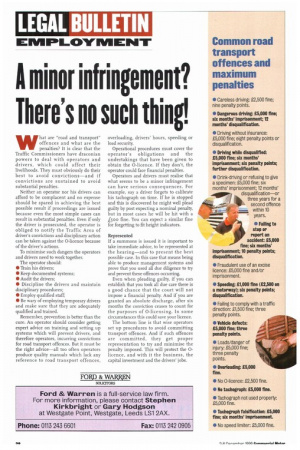A minor infringement?
Page 30

If you've noticed an error in this article please click here to report it so we can fix it.
There's no such thing!
What are "road and transport" offences and what are the penalties? It is clear that the Traffic Commissioners have draconian powers to deal with operators and drivers, which could affect their livelihoods. They must obviously do their best to avoid convictions—and if convictions are sustained to avoid substantial penalties.
Neither an operator nor his drivers can afford to be complacent and no expense should be spared in achieving the best possible result if proceedings are issued because even the most simple cases can result in substantial penalties. Even if only the driver is prosecuted, the operator is obliged to notify the Traffic Area of driver's convictions and disciplinary action can be taken against the 0-licence because of the driver's actions.
To minimise such dangers the operators and drivers need to work together.
The operator should: • Train his drivers; • Keep documented systems; • Audit the drivers; • Discipline the drivers and maintain disciplinary procedures; • Employ qualified staff; • Be wary of employing temporary drivers and make sure that they are adequately qualified and trained.
Remember, prevention is better than the cure. An operator should consider getting expert advice on training and setting up systems which will prevent drivers, and therefore operators, incurring convictions for road transport offences. But it must be the right advice—all too often operators produce quality manuals which lack any reference to road transport offences, overloading, drivers' hours, speeding or load security.
Operational procedures must cover the operator's obligations and the undertakings that have been given to obtain the 0-licence. If they don't, the operator could face financial penalties.
Operators and drivers must realise that what seems to be a minor infringement can have serious consequences. For example, say a driver forgets to calibrate his tachograph on time. If he is stopped and this is discovered he might well plead guilty by post expecting a nominal penalty, but in most cases he will be hit with a £500 fine. You can expect a similar fine for forgetting to fit height indicators.
Represented If a summons is issued it is important to take immediate advice, to be represented at the hearing—and to present the best possible case. In this case that means being able to produce management systems and prove that you used all due diligence to try and prevent these offences occurring.
Even when pleading guilty, if you can establish that you took all due care there is a good chance that the court will not impose a financial penalty. And if you are granted an absolute discharge, after six months the conviction ceases to count for the purposes of 0-licensing. In some circumstances this could save your licence.
The bottom line is that wise operators Set up procedures to avoid committing transport offences. And if such offences are committed, they get proper representation to try and Minimise the penalty imposed. This will protect the 0licence, and with it the business, the capital investment and the drivers' lobs.








































































































